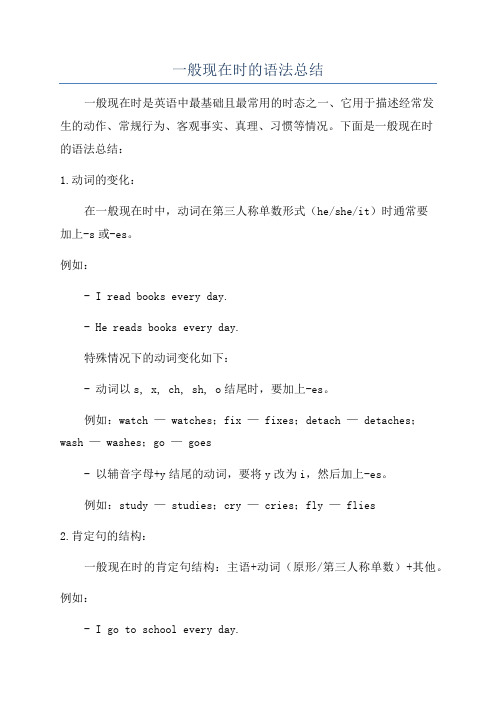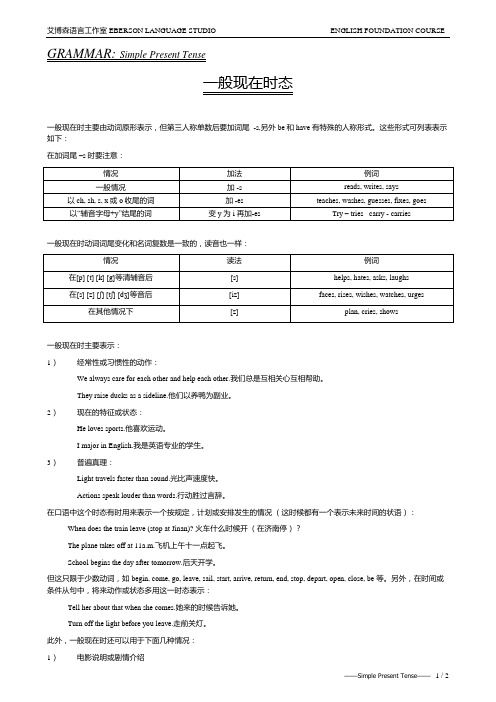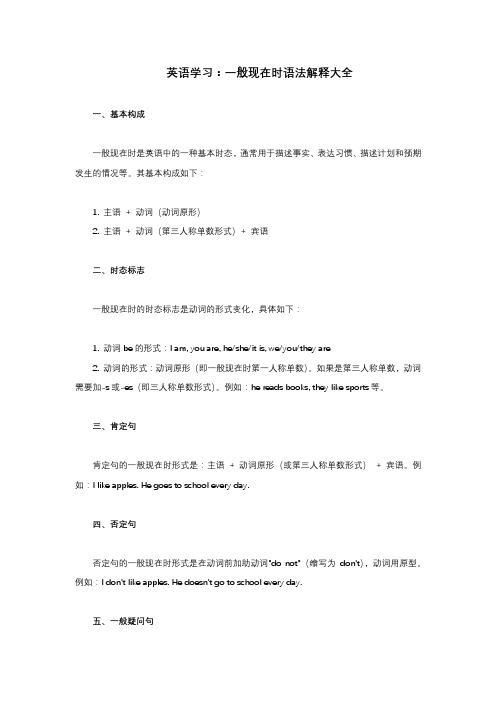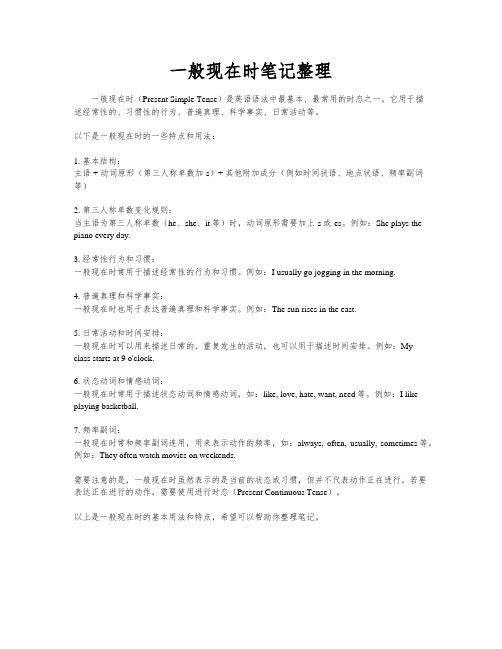测评学习资料-牛津英语5A英语语法(三) 一般现在时
牛津英语英语语法一般现在时

牛津英语英语语法(三)一般现在时一. 一般现在时行为动词词型变化形式一般现在时动词只有第三人称有词形变化,其他人称动词均用原形单数第三人称动词变化:多数在动词后加s play—plays like—likes ,以s,x,sh,ch,o结尾的动词加es go—goes wash--washes,以辅音字母加y结尾,把y改i再加es fly—flies study--studies二. 一般现在时动词be和have的变化形式1.动词Be 叫连系动词, 连系动词be的用法:除了第一人称单数用am,和第三人称单数用is以外,其它人称用are。
I am busy. You are busy. He (She) is busy. We (You, They) are busy.2.动词have的用法:除了第三人称单数用has以外,其它人称一律用have。
如:I have a pen. You have a pen. She (He) has a pen.We (You, They) have pens.三. 一般现在时的句型1.肯定句构成:主语+动词(注意人称变化) +其它成分Ihave a dog. We like the little cat. She sings well.2.否定句构成:行为动词的否定句:主语+助动词(do/does) + not +动词原形+其它成分He dosen’t have a dog.He isn’t young.We don’t like the little cat.(借助于助动词do) She doesn’t sing well. (借助于助动词does)3.一般疑问句:A.行为动词的一般疑问句:助动词(do/does)+主语+动词原形+ 其它成分Do you like i t? Yes, I do. / No. I don’t .Does he(she) like it? Yes, he( she )does. / No, he ( she )doesn’t.B. 动词BE 的一般疑问句Am / Is /Are +主语+ 其它成分Are you a teacher? Yes, I am. / No, I am not.Are they students of your school.Yes they are / No they aren,t.4.特殊疑问句:特殊疑问词+ 一般疑问句How many students are there in your school?What do you usually do on Sunday?四.一般现在时的用法1.经常性或习惯性的动作,常与表示频度的时间状语连用。
一般现在时的语法总结

一般现在时的语法总结一般现在时是英语中最基础且最常用的时态之一、它用于描述经常发生的动作、常规行为、客观事实、真理、习惯等情况。
下面是一般现在时的语法总结:1.动词的变化:在一般现在时中,动词在第三人称单数形式(he/she/it)时通常要加上-s或-es。
例如:- I read books every day.- He reads books every day.特殊情况下的动词变化如下:- 动词以s, x, ch, sh, o结尾时,要加上-es。
例如:watch — watches;fix — fixes;detach — detaches;wash — washes;go — goes- 以辅音字母+y结尾的动词,要将y改为i,然后加上-es。
例如:study — studies;cry — cries;fly — flies2.肯定句的结构:一般现在时的肯定句结构:主语+动词(原形/第三人称单数)+其他。
例如:- I go to school every day.- She reads books in the library.3.否定句的结构:一般现在时的否定句结构:主语 + do/does + not + 动词原形(第三人称单数要加s)+ 其他。
例如:- I do not go to school on Sundays.- She does not read books in the library.4.疑问句的结构:一般现在时的疑问句结构:Do/Does + 主语 + 动词原形(第三人称单数要加s)+ 其他?例如:- Do you go to school every day?- Does she read books in the library?5.特殊疑问句的结构:一般现在时的特殊疑问句结构:疑问词 + do/does + 主语 + 动词原形(第三人称单数要加s)+ 其他?例如:- What do you do every day?- Why does she read books in the library?6.时间状语词:在一般现在时句子中,可以使用各种时间状语来说明动作发生的时间,常用的时间状语词有:- always(总是)- frequently(经常)- usually(通常)- often(常常)- seldom(很少)- never(从不)- every day/week/month/year(每天/每周/每月/每年)- on Sundays/Mondays/etc.(在星期天/星期一/等等)7.习惯和常态:一般现在时用于描述习惯、常态和客观事实的情况。
英语语法-03- 一般现在时

GRAMMAR:Simple Present Tense一般现在时态一般现在时主要由动词原形表示,但第三人称单数后要加词尾 -s,另外be 和have 有特殊的人称形式。
这些形式可列表表示如下:在加词尾–s 时要注意:一般现在时动词词尾变化和名词复数是一致的,读音也一样:一般现在时主要表示:1)经常性或习惯性的动作:We always care for each other and help each other.我们总是互相关心互相帮助。
They raise ducks as a sideline.他们以养鸭为副业。
2)现在的特征或状态:He loves sports.他喜欢运动。
I major in English.我是英语专业的学生。
3)普遍真理:Light travels faster than sound.光比声速度快。
Actions speak louder than words.行动胜过言辞。
在口语中这个时态有时用来表示一个按规定,计划或安排发生的情况(这时候都有一个表示未来时间的状语):When does the train leave (stop at Jinan)? 火车什么时候开(在济南停)?The plane takes off at 11a.m.飞机上午十一点起飞。
School begins the day after tomorrow.后天开学。
但这只限于少数动词,如begin, come, go, leave, sail, start, arrive, return, end, stop, depart, open, close, be 等。
另外,在时间或条件从句中,将来动作或状态多用这一时态表示:Tell her about that when she comes.她来的时候告诉她。
Turn off the light before you leave.走前关灯。
英语学习:一般现在时语法解释大全

英语学习:一般现在时语法解释大全一、基本构成一般现在时是英语中的一种基本时态,通常用于描述事实、表达习惯、描述计划和预期发生的情况等。
其基本构成如下:1. 主语+ 动词(动词原形)2. 主语+ 动词(第三人称单数形式)+ 宾语二、时态标志一般现在时的时态标志是动词的形式变化,具体如下:1. 动词be的形式:I am, you are, he/she/it is, we/you/they are2. 动词的形式:动词原形(即一般现在时第一人称单数)。
如果是第三人称单数,动词需要加-s或-es(即三人称单数形式)。
例如:he reads books, they like sports等。
三、肯定句肯定句的一般现在时形式是:主语+ 动词原形(或第三人称单数形式)+ 宾语。
例如:I like apples. He goes to school every day.四、否定句否定句的一般现在时形式是在动词前加助动词"do not"(缩写为don't),动词用原型。
例如:I don't like apples. He doesn't go to school every day.五、一般疑问句一般疑问句的一般现在时形式是把助动词"do"或"does"放在句首,动词用原型。
例如:Do you like apples? Does he go to school every day?六、特殊疑问句特殊疑问句的一般现在时形式是以疑问词开头,后面接一般疑问句。
例如:What do you like? Where does he go to school?七、第三人称单数当主语是第三人称单数(he/she/it)时,动词需要变为第三人称单数形式,一般在动词后加-s或-es。
例如:he reads books, she goes to the park等。
英语学习:一般现在时解释大全

英语学习:一般现在时解释大全一、定义一般现在时,是一种英语语法形式,表示现在发生的动作或存在的状态,以及经常或习惯性的动作。
二、形式一般现在时的基本形式是:主语+ 动词be(am/is/are)+ 或者+ 动词(单三形式)。
三、时间状语一般现在时通常与以下时间状语连用:always, usually, often, sometimes, every day (week, month, year…), once a day, on Sundays等。
四、时态变化1. 动词be(am/is/are)的时态变化:I am, you are, he/she/it is, we/you/they are。
2. 动词的时态变化:一般现在时,动词用原型(即一般现在时第一人称单数)。
如果是第三人称单数,动词需要加-s或-es(即三人称单数形式)。
例如:he reads books, they like sports等。
五、否定句否定句的一般现在时形式是在动词前加助动词"do not"(缩写为don't),动词用原型。
例如:I don't like apples. He doesn't go to school on Sundays.六、疑问句疑问句的一般现在时形式是把助动词"do"或"does"放在句首,动词用原型。
例如:Do you like apples? Does he go to school on Sundays?七、表示规律性动作一般现在时可以表示按照一定规律反复出现的动作或情况。
例如:We have Chinese classes on Mondays. (我们周一有语文课。
)或者It always rains on Wednesdays.(星期三总是下雨。
)八、表示现在的状态一般现在时也可以表示目前的状态。
例如:My brother is a student.(我的弟弟是一名学生。
小学英语语法-一般现在时详细讲解

小学英语语法-一般现在时详细讲解一般现在时是英语语法中最基础也是最常用的时态之一。
它表示的是习惯性、经常性和普遍性的行为或状态。
在本文中,我将详细介绍一般现在时的形式、用法和注意事项。
一、一般现在时的形式一般现在时的肯定句的基本结构是:主语+谓语动词+其他。
谓语动词在第三人称单数形式时要加上-s或-es。
例如:- I eat breakfast every morning.(我每天早上吃早饭。
)- She goes to school by bus.(她坐公共汽车去学校。
)否定句的结构是:主语+do not/does not+动词原形+其他。
例如:- I do not like coffee.(我不喜欢咖啡。
)- He does not play football.(他不踢足球。
)疑问句的结构是:Do/Does+主语+动词原形+其他?例如:- Do you like ice cream?(你喜欢冰淇淋吗?)- Does she go to the park every weekend?(她每个周末去公园吗?)二、一般现在时的用法第1页/共4页1. 表示习惯或经常性的动作:- I write in my diary every night.(我每天晚上写日记。
)- They play basketball every Sunday.(他们每个星期天打篮球。
)2. 表示客观事实、自然规律或科学真理:- Water boils at 100 degrees Celsius.(水在100摄氏度时煮沸。
)- The sun rises in the east.(太阳从东方升起。
)3. 表示感觉、想法和喜好:- I love chocolate.(我喜欢巧克力。
)- He hates to wake up early.(他讨厌早起。
)4. 表示现时状态或现时临时的动作:- I am a student.(我是一个学生。
上海牛津小学英语语法知识总结(最新整理)

∙一般情况下,直接加s 如:read-reads,swim-swims∙以s,x,sh,ch,o结尾,加es 如:wash-washes,watch-watches,do-does ∙以辅音字母+y结尾,变y为i,再加es 如:study-studies,fly-flies∙不规则变化如:have-has4、一般现在时的句型转换:肯定句否定句一般疑问句及回答They watch TV every day.They don’t watch TVevery day.—Do they watch TV every day?—Yes, they do. / No, they don’t.She watches TV She doesn’t watch— Does she watch TV every day?every every day.—Yes, she does. / No, she doesn’t.现在进行时1、定义:表示现在或现阶段正在进行或发生的动作。
句中常有now,look,listen等词。
如:I am washing clothes now.Look! Liu Tao is climbing the tree.Listen! Jane is singing in the music room.2、构成:be动词(am/is/are)+ 动词现在分词(V-ing)3、动词现在分词构成:∙一般是在动词原形后加ing如:read-reading,drink-drinking,eat-eating,look-looking∙以不发音的e结尾的动词,去掉e,再加ing如:write-writing,make-making,ride-riding,take-taking∙以重读闭音节结尾,如末尾只有一个辅音字母,要双写这个字母,再加ing如:sit-sitting,swim-swimming,put-putting,run-running,stop-stopping,get-getting,begin-beginning,jog-jogging,forget-forgetting4、动名词其实就是动词的现在分词,它既有名词性质(可作主语),又有动词性质(可带宾语)。
一般现在时笔记整理

一般现在时笔记整理一般现在时(Present Simple Tense)是英语语法中最基本、最常用的时态之一。
它用于描述经常性的、习惯性的行为、普遍真理、科学事实、日常活动等。
以下是一般现在时的一些特点和用法:1. 基本结构:主语 + 动词原形(第三人称单数加-s)+ 其他附加成分(例如时间状语、地点状语、频率副词等)2. 第三人称单数变化规则:当主语为第三人称单数(he、she、it等)时,动词原形需要加上-s或-es。
例如:She plays the piano every day.3. 经常性行为和习惯:一般现在时常用于描述经常性的行为和习惯。
例如:I usually go jogging in the morning.4. 普遍真理和科学事实:一般现在时也用于表达普遍真理和科学事实。
例如:The sun rises in the east.5. 日常活动和时间安排:一般现在时可以用来描述日常的、重复发生的活动,也可以用于描述时间安排。
例如:My class starts at 9 o'clock.6. 状态动词和情感动词:一般现在时常用于描述状态动词和情感动词,如:like, love, hate, want, need等。
例如:I like playing basketball.7. 频率副词:一般现在时常和频率副词连用,用来表示动作的频率,如:always, often, usually, sometimes等。
例如:They often watch movies on weekends.需要注意的是,一般现在时虽然表示的是当前的状态或习惯,但并不代表动作正在进行。
若要表达正在进行的动作,需要使用进行时态(Present Continuous Tense)。
以上是一般现在时的基本用法和特点,希望可以帮助你整理笔记。
- 1、下载文档前请自行甄别文档内容的完整性,平台不提供额外的编辑、内容补充、找答案等附加服务。
- 2、"仅部分预览"的文档,不可在线预览部分如存在完整性等问题,可反馈申请退款(可完整预览的文档不适用该条件!)。
- 3、如文档侵犯您的权益,请联系客服反馈,我们会尽快为您处理(人工客服工作时间:9:00-18:30)。
牛津英语5a英语语法(三)一般现在时一. 一般现在时行为动词词型变化形式一般现在时动词只有第三人称有词形变化,其他人称动词均用原形单数第三人称动词变化:多数在动词后加s play—plays like—likes ,以s,x,sh,ch,o结尾的动词加es go—goes wash--washes,以辅音字母加y结尾,把y改i再加es fly—flies study--studies二. 一般现在时动词be和have的变化形式1.动词Be 叫连系动词, 连系动词be的用法:除了第一人称单数用am,和第三人称单数用is以外,其它人称用are。
I am busy. You are busy. He (She) is busy. We (You, They) are busy.2.动词have的用法:除了第三人称单数用has以外,其它人称一律用have。
如:I have a pen. You have a pen. She (He) has a pen.We (You, They) have pens.三. 一般现在时的句型1.肯定句构成:主语+动词(注意人称变化) +其它成分Ihave a dog. We like the little cat. She sings well.2.否定句构成:行为动词的否定句:主语+助动词(do/does) + not +动词原形+其它成分He dosen’t have a dog.He isn’t young.We don’t like the little cat.(借助于助动词do) She doesn’t sing well. (借助于助动词does)3.一般疑问句:A.行为动词的一般疑问句:助动词(do/does)+主语+动词原形+ 其它成分Do you like it? Yes, I do. / No. I don’t .Does he(she) like it? Yes, he( she )does. / No, he ( she )doesn’t.B. 动词BE 的一般疑问句Am / Is /Are +主语+ 其它成分Are you a teacher? Yes, I am. / No, I am not.Are they students of your school.Yes they are / No they aren,t.4.特殊疑问句:特殊疑问词+ 一般疑问句How many students are there in your school?What do you usually do on Sunday?四.一般现在时的用法1.经常性或习惯性的动作,常与表示频度的时间状语连用。
如:every year, sometimes, at 5 o’clock, on Sunday.I get up at six o’clock ev ery day.He gets up at six o’clock every day.She smokes too much.I telephone to my parents once a week.2.表达客观真理,科学事实。
如果出现在宾语从句中,即使主句是过去时,从句谓语也要用一般现在时。
Three and four makes seven.The teacher told us that the earth moves around the sun.Shenyang lies in the north of China.3.在格言或名言警句中。
Pride goes before a fall. 骄必败。
Actions speak louder than words.事实用于雄辩。
4.表示现在的状态、性格、个性。
I don’t want more, thanks.He is a good student. He is always ready to help others.五.一般现在时其它用法一般现在时表将来1.含有go, come, return, arrive, leave, start, begin等动词的一般现在时表将来。
表示在时间上已确定或安排好的事情。
The school bus leaves at eight .2.在时间或条件句中。
When Tom comes, ask him how to fix the tap.I’ll help you as soon as I arrive there.3.在动词hope,take care that,make sure that等后。
I hope she has a good time.Before you leave the room, please make sure that the door is closed.4.时间状语从句,条件句中,从句中(常含有till , once , as soon as ,when , while , before , after , so long as , by the time , if , in case ,unless , even if , whether , the moment , the minute )Eg. As soon as I get there, I will deal with this matter.Whether he is happy is an important thing to her.5.倒装句,表示动作正在进行Here comes the teacher!= The teacher is coming.There goes the bell. = The bell is ringing.Here comes the car. = The car is coming.一般现在时表过去1."书上","报纸上"的叙述。
The newspaper says that the president will retire next month.2.叙述往事,使其生动。
Napoleon’s army now advances and the great battle begins.一般现在时表完成1.动词用一般现在时代替完成时:hear , tell , learn , write , understand , forget , know , find , say, remember.Eg.I hear (= have heard) he will go to Paris.I forget (=have forgotten) how to read the word.2.句型" It is … since… " = " It has been … since …"It is (= has been) five years since we last met.一般现在时表进行1.句型:Here comes…;There goe s…Eg: Look, here comes Mr. Brown.六. 注意事项1.在英国,人们常用have got代替have,特别在疑问句和否定句中。
2.当have如果不表示“有”时,构成疑问或否定句时,就借助于助动词do, does, don’t或者doesn’t.练习一.用词的适当形式填空。
1.What time_________ his father_________(do) the work?2.He _________(get) up at five o’clock.3.__________ you _________(brush) your teeth every morning.4.What ________ ( do ) he usually ________( do ) after school?5.Tom ________ ( study ) English, Chinese, Maths, Science and Art at school.6. Kitty sometimes __________(go) to the park with his sister.7.At eight at night, she __________( watch ) TV with her parents.8. ________ Mike________( read ) English every day?9.How many lessons________ your classmates______( have ) on Monday?10.We often___________ ( play ) football in the playground.二.选择() 1. _____ you have a book?A. DoB. AreC. IsD. Have()2. They _________ on a farm.A. workingB. is workC. workD. is worked() 3. Does Peter like to watch TV?__________.A. Yes, he likeB. No, he doesn’tC. Yes, he’d likeD. No, he likes ()4. She doesn’t __________ her homework in the afternoon.A. doingB. to doC. doesD. do()5. How ____________ Mr. Brown ___________ to America?A. do,goB. is,goC. does,goD. does,goes()6. Where’s my camera? I____________ it.A. am not findingB. am not seeingC. can’t findD. can’t look at ()7. How ___________ he go to work?He ___________ to work by bike.A. does ;goB. do;goesC. do ;goD. does;goes()8. ______ you usually late for school?No, _____________.A. Do ; I amB. Does ;notC. Are ; I’m notD. Are ; I aren’t()9. _____ she _____ home at six every day?A. Is , leaveB. Does , leaveC. Is , leavesD. Does , left()10. Mr. Yang ____________ English this term.A. teaches ourB. teaches usC. teachs usD. teach our答案:一.1.does, do 2. gets 3. Do, brush 4. does, do 5. studies 6. goes7. watches8. Does, read9. do, have10. play二.1---5 A C B D C6---10 C D C B B本卷由《100测评网》整理上传,专注于中小学生学业检测、练习与提升.。
